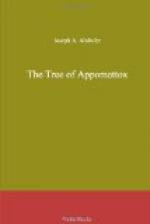“It is a violin,” said De Langeais, “but it’s not mine. The sound comes from a point at the head of the cove before us.”
They rode into the little valley and the song of the violin grew louder. It was somebody vigorously playing “Old Dan Tucker,” and as the woods opened they saw a stout log cabin, a brook and some fields. The musician, a stalwart young man, sat in the doorway of the house. A handsome young woman was cooking outside, and a little child was playing happily on the grass.
“I’ll ride forward and speak to them,” said Harry Kenton. “That man and I are old friends.”
The violin ceased, as the thud of hoofs drew near, but Harry, springing from his horse, held out his hand to the man and said:
“How are you, Dick Jones? I see that the prophecy has come true!”
The man stared at him a moment or two in astonishment, and then grasped his hand.
“It’s Mr. Kenton!” he cried, “an’ them’s your friends behind you. ’Light, strangers, ’light! Yes, Mr. Kenton, it’s come true. I’ve been back home a week, an’ not a scratch on me, though I’ve fit into nigh onto a thousand battles. I reckon my wife, that’s Mandy there, wished so hard fur me to come back that the Lord let her have her way. But ’light, strangers! ‘Light an’ hev supper!”
“We will,” said Harry, “but we’re not going to crowd you out of your house. We’ve plenty of food with us, and we’re accustomed to sleeping out of doors.”
Nevertheless the hospitality of Dick Jones and his wife, Mandy, was unbounded. It was arranged that the two colonels should sleep inside, while the others took to the grass with their blankets. Liberal contributions were made to the common larder by the travelers, and they had an abundant supper, after which the men sat outside, the colonels smoking good old North Carolina weed, and Mrs. Jones knitting in the dusk.
“Don’t you and your family get lonesome here sometimes, Mr. Jones?” asked Harry.
“Never,” replied the mountaineer. “You see I’ve had enough o’ noise an’ multitudes. More than once I’ve seen two hundred thousand men fightin’, and I’ve heard the cannon roarin’, days without stoppin’. I still git to dreamin’ at night ‘bout all them battles, an’ when I awake, an’ set up sudden like an’ hear nothin’ outside but the tricklin’ o’ the branch an’ the wind in the leaves, I’m thankful that them four years are over, an’ nobody is shootin’ at nobody else. An’ it’s hard now an’ then to b’lieve that they’re really an’ truly over.”
“But how about Mrs. Jones?”
“She an’ the baby stayed here four whole years without me, but we’ve got neighbors, though you can’t see ’em fur the trees. Jest over the ridge lives her mother, an’ down Jones’ Creek, into which the branch runs, lives her married sister, an’ my own father ain’t more’n four miles away. The settlements are right thick ‘roun’ here, an’ we hev good times.”




